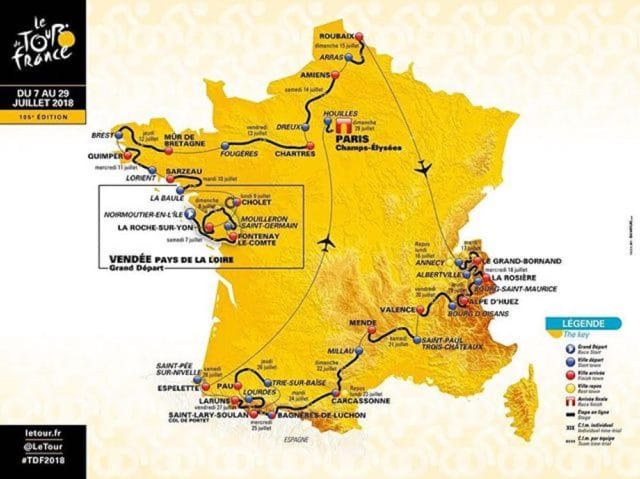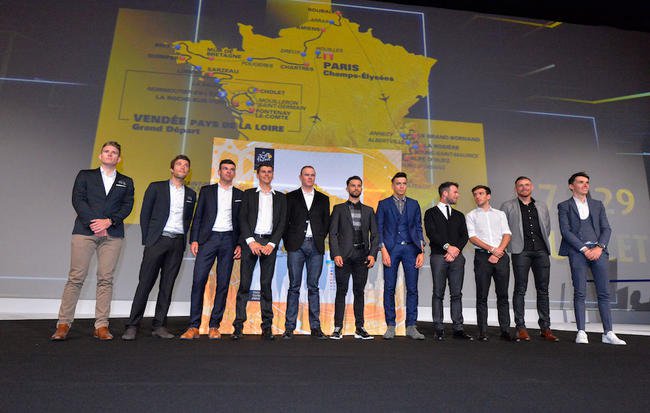Why 2018’s Route is the Best in Recent Memory
With tricky summit finishes, unorthodox time trials, and the most cobblestone in three decades, next year's Tour de France is a classic in the making
With tricky summit finishes, unorthodox time trials, and the most cobblestone in three decades, next year’s Tour de France is a classic in the making –

The 2018 Tour de France is gonna wild. Race organisers held their annual route announcement on Tuesday, unveiling 21 stages with a fascinating mix of classic climbs, unpredictable uphill finishes, and more cobblestone than the Tour has seen in 30 years.
It all adds up to perhaps the most challenging course in recent memory, especially for defending champion Chris Froome, who hopes to join the exclusive five-time winners club.

Tour director Christian Prudhomme pointed to the course’s unpredictability. “We especially wanted to emphasize stage variety to provide a vision of modern and inspired cycling,” he said. In practice, that means mingling iconic Tour locations with fresh routes and formats.
Whoever emerges as the winner in Paris will have to survive eight flat stages, several of which where tricky coastal crosswinds could play a role; six hilly stages with three unconventional short-summit finishes; six high-mountain stages with three summit finishes; and both team and individual time trials on courses not typically suited to time-trial experts.
Here are the stages that could prove the most crucial:
Stage 3: Cholet – 35km (TTT)
The roads around Cholet are lightly rolling but never flat. Froome’s Sky, Richie Porte’s BMC, and Tom Dumoulin’s Sunweb teams will be the favorites here. (Dumoulin, who won the 2017 Giro d’Italia, has not yet said if he’ll race.) But team cohesion will matter as much as strength—the winner gets the early yellow jersey, but also has to defend it.
Stage 5: Lorient to Quimper – 203km
Much will be made of Stage 6’s short, punchy finish at Mur de Bretagne, but don’t sleep on this long, tricky stage in Brittany. The first half goes up coastal roads straight into likely crosswinds that could produce echelons, and there’s an uphill finish in Quimper with grades of up to 10.7 percent.
Stage 9: Arras to Roubaix – 154km
Since 1989, the Tour route has never featured more than 13.3km of cobblestone sectors. In 2018, it will have 21.7km of cobble roads—a 60 percent jump. This is a true Paris-Roubaix-style stage, with the first set of cobbles coming just 47km in and traversing a few of the most feared spots, like Mons-en-Pevele (900 meters) and Camphin-en-Pevele (1,800 meters). This will be a must-watch day.
Stage 12: Bourg-Saint-Maurice to Alpe d’Huez – 175km
After a two-year absence, the fabled Alpe d’Huez, with its 21 switchbacks, returns on a day of additional massive climbs, including the Col de la Madeleine (25km long) and the Col de Croix de Fer (29km).
Stage 16: Carcassonne to Bagneres-de-Luchon – 218km
The longest stage will come after the second rest day, punishing anyone who hasn’t returned to form. There are three steep Pyrenean climbs, and the descent from the Col du Portillon to the finish line in Bagneres-de-Luchon will reward aggressive riders, much like the descent of the Mont du Chat on Stage 9 blew up the race this year.
Stage 17: Bagneres-de-Luchon to Saint-Lary-Soulan – 65km
The shortest road stage in 30 years, this tricky Pyrenean sprint is a perfect example of modern bike racing: short, fierce, punchy stages that incentivize bold, early attacks. It also has three solid climbs, including a summit finish at Saint-Lary-Soulan on the Col de Portet—a 16km grind with the steepest parts at the beginning and just before the finish.
Stage 20: Saint-Pée-sur-Nivelle to Espelette – 31km (ITT)
The only individual time trial on the route, this 31km test against the clock features a rolling course with a short, sharp climb (the Cote de Pinodieta, with a 10.2 percent grade). It will test pacing, climbing, and handling skills and should make for a battle between the general-classification contenders. Should Froome and Dumoulin be close on overall time here, the race could come down to this day.
READ MORE ON: international races Race News road Tour de France

